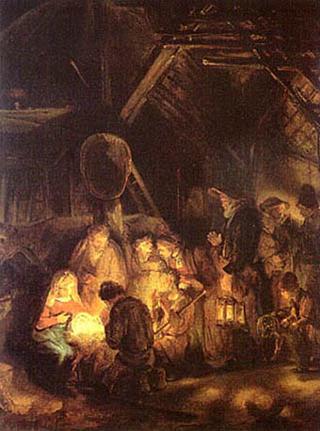The Birth of Jesus by Rembrandt
“This is how the birth of Jesus Christ came about- His mother Mary was pledged to be married to Joseph, but before they came together, she was found to be with child through the Holy Spirit. ”
– Matthew 1-18
It is difficult to date with precision the exact point, sometime around the turn of the era, when Jesus was born. Christian traditions placing his birth in Bethlehem, the birthplace of King David, must be seen as an attempt to identify Jesus as the messiah son of David whom the Jewish people expected to redeem them from Roman domination. Jesus grew up in Galilee, where he became a preacher. Many of his ideas were similar to those of his brethren in the various sects, including the Pharisees and the Dead Sea and apocalyptic sects. Yet already in his early career, as portrayed in the Gospels, he disagreed with the Pharisees on matters of Jewish law. The New Testament accounts presage the later Jewish-Christian schism and may even be a reflection of it. In any case, Jesus’s teachings apparently raised the ire of some of the Hellenized Jews in the leadership of the high priesthood, as well as of the Romans, who decreed his crucifixion. It is impossible from the incomplete accounts we have to determine exactly what led to the execution of Jesus, yet we know the tragic results of the widespread Christian assumption that the Jews were responsible for it. The challenge posed by Jesus to the Jewish authorities cannot have been of such significance as to warrant a demand for his execution. The Romans, however, had both a vested political interest in his death and the authority to execute him. To a large extent, however, it was the fact that his followers came to believe that he had been resurrected from his grave that gave impetus to the emerging faith.
The followers of Jesus in the early days of his career and soon afterwards gathered together in Jerusalem and formed (according to the Acts of the Apostles) a small group which sought both to live as Jews and to accept the messiahship of Jesus. It was only later that the notion of the divinity of Jesus appeared, toward the end of the New Testament redactional process in the second half of the first century C.E. Thus the early Christian sect began as a coterie of Jews seeking to propagate the belief in Jesus as messiah and evolved into an apostolic group seeking to convert the world. Following the lead of Peter, Paul convinced the fledgling church to formally open itself to gentile converts and brought to it the notion of a mission to the gentiles, transforming Christianity in the process. He also encouraged the notion of abandoning the law. His literary legacy greatly intensified the anti-Jewish notions in the New Testament.
